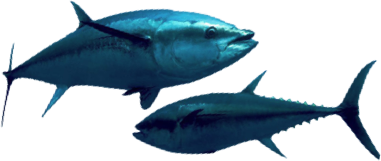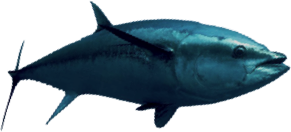The CCSBT has agreed to a variety of binding and non-binding measures related to mitigation of bycatches.
Binding Measures
Binding measures agreed by the CCSBT comprise:
- Resolution to Align CCSBT’s Ecologically Related Species measures with those of other tuna RFMOs (Adopted October 2018 and most recently revised in October 2025).
In accordance with the Resolution to Align CCSBT’s Ecologically Related Species measures with those of other tuna RFMOs, the following measures of IOTC, WCPFC, or ICCAT are binding on Members of the CCSBT when fishing within the relevant area of competence:
Area of Competence of the IOTC
- Resolution 12/04 On the conservation of marine turtles;
- Resolution 12/09 On the Conservation of Thresher Sharks (Family Alopiidae) caught in Association with Fisheries in the IOTC area of competence (will be superseded by Resolution 25/08 on 1-Jan-2026);
- Resolution 13/05 On the conservation of whale sharks (Rhincodon typus) (will be superseded by Resolution 25/08 on 1-Jan-2026);
- Resolution 13/06 On a scientific and management framework on the conservation of shark species caught in association with IOTC managed fisheries (will be superseded by Resolution 25/08 on 1-Jan-2026);
- Resolution 17/05 on the conservation of sharks caught in association with fisheries managed by IOTC (will be superseded by Resolution 25/08 on 1-Jan-2026);
- Resolution 18/02 On management measures for the conservation of blue shark caught in association with IOTC fisheries (will be superseded by Resolution 25/08 on 1-Jan-2026);
- Resolution 19/03 On the conservation of mobulid rays caught in association with fisheries in the IOTC Area of Competence;
- Resolution 23/06 On the conservation of cetaceans;
- Resolution 23/07 On reducing the incidental bycatch of seabirds in longline fisheries;
- Resolution 25/08 On the conservation of sharks caught in association with fisheries managed by IOTC (enters into force on 1-Jan-2026 and supersedes resolutions 18/02, 17/05, 13/05, 13/06, and 12/09); and
- Resolution 25/09 On the conservation of shortfin and longfin mako sharks caught in association with IOTC fisheries.
Convention Area of the WCPFC
- Resolution 2018/03 - Conservation and Management Measure to mitigate the impact of fishing for highly migratory fish stocks on seabirds;
- Resolution 2018/04 - Conservation and Management Measure of Sea Turtles;
- Resolution 2019/05 - Conservation and Management Measure on Mobulid Rays Caught in Association with Fisheries in the WCPFC Convention Area; and
- Resolution 2022/04 – Conservation and Management Measure for Sharks (supersedes CMM 2019/04);
Convention Area of the ICCAT
- Resolution 95-02 on cooperation with the Food and Agriculture Organization of the United Nations (FAO) with regard to study on the status of stocks and by-catches of shark species;
- Resolution 03-10 on the shark fishery;
- Recommendation 04-10 concerning the conservation of sharks caught in association with fisheries managed by ICCAT;
- Resolution 05-08 on circle hooks;
- Supplemental Recommendation 07-06 Concerning Sharks;
- Recommendation 07-07 on Reducing Incidental Bycatch of Seabirds in Longline Fisheries;
- Recommendation 09-07 on the Conservation of Thresher Sharks Caught in Association with Fisheries in the ICCAT Convention Area;
- Recommendation 10-07 on the Conservation of Oceanic Whitetip Shark Caught in Association with fisheries in the ICCAT Convention Area;
- Recommendation 10-08 on Hammerhead Sharks (family Sphyrnidae) caught in Association with Fisheries Managed by ICCAT;
- Recommendation 11-08 on the Conservation of Silky Sharks Caught in Associated with ICCAT Fisheries;
- Supplemental Recommendation 11-09 on Reducing Incidental By-Catch of Seabirds in ICCAT Longline Fisheries;
- Recommendation 11-10 on Information Collection and Harmonization of Data on By-catch and Discards in ICCAT Fisheries;
- Recommendation 13-10 on Biological Sampling of Prohibited Shark Species by Scientific Observers;
- Recommendation 15-06 on Porbeagle Caught in Association with ICCAT Fisheries;
- Recommendation 22-12 on the bycatch of sea turtles caught in association with ICCAT fisheries (combine, streamline, and amend recommendations 10-09 and 13-11);
- Recommendation 23-12 for the conservation of whale sharks (Rhincodon typus) caught in association with ICCAT fisheries;
- Supplemental Recommendation 23-13 amending recommendation 22-12 on the bycatch of sea turtles caught in association with ICCAT fisheries;
- Recommendation 23-15 on cetacean encirclement; and
- Recommendation 24-12 on morbulid rays (family mobulidae) caught in association with ICCAT fisheries.
Non-Binding Measures
Non-Binding measures agreed by the CCSBT include:
- Members shall:
- Exchange information concerning new or refined techniques to reduce incidental catch of seabirds and cooperate in developing and assessing the effectiveness of such techniques, including those with the objective of preventing the approach of seabirds to fishing vessels or restraining the feeding activities of seabirds. In introducing a technique, a Member will consider its effectiveness in reducing the incidental catch of ecologically related species, and the costs and benefits, including possible impacts on harvesting of tuna.
- Continue to assess the effectiveness of the measures described in the points above.
- Promote, among the fishers concerned, understanding about the incidental capture of seabirds and measures which can be implemented to reduce seabird capture in longline operations.
- Members should:
- Promote the use of appropriately designed and deployed tori lines in SBT longline fishing operations
- Take the following measures, as appropriate, in longline fisheries while taking southern bluefin tuna:
- avoid the dumping of offal as far as possible while longlines are being set or hauled; and
- use thawed baits.
- Make every effort to ensure that birds captured alive during longlining are released alive and that wherever possible hooks are removed without jeopardising the life of the bird concerned.
- In accordance with CCSBT’s Recommendation to Mitigate the Impact on Ecologically Related Species of Fishing for Southern Bluefin Tuna (Revised October 2019), Members will, to the extent possible, implement the International Plan of Action for Reducing Incidental Catches of Seabirds in Longline Fisheries (IPOA-Seabirds), the International Plan of Action for the Conservation and Management of Sharks (IPOA-Sharks), and the FAO Guidelines to reduce sea turtle mortality in fishing operations (FAO-Sea turtles), if they have not already done so.
Education to Minimise Bycatch
CCSBT commenced the project on enhancing education on and implementation of Ecologically Related Species seabird measures within CCSBT Fisheries (Seabird Project) in March 2022. This project is funded by the FAO-GEF Project “Sustainable Management of Tuna Fisheries and Biodiversity Conservation in the Areas Beyond National Jurisdiction (ABNJ)”. As a part of the Seabird Project, educational seabird bycatch mitigation infographics have been developed to convey useful information in a visual format. They show key features of seabird bycatch mitigation measures that were in force in 2024 and applicable to SBT fisheries.
Education pamphlets on seabirds and sharks have been produced and distributed to SBT fishers since 2003. Technical (mainly taxonomical) aspects of these pamphlets were updated in 2011-13. These are;
- English versions (Seabird (Zip 58.6MB), Shark (Zip 38.4MB))
- Japanese versions (Zip 97.0MB)
- Korean versions (Zip 95.6MB)
- Mandarin versions (Zip 80.9MB)
- Indonesian versions (Zip 95.7MB)
CCSBT does not have its own education pamphlets on sea turtles, but the following useful material is available:
- WCPFC Guidelines for the Handling of Sea Turtles; and
- FAO: Guidelines to Reduce Sea Turtle Mortality in Fishing Operations: Note: While this guide is far too detailed to be useful in the field, relevant details could be useful to CCSBT fishers, such as information on procedures for turtle recovery after a capture and types of tools that can be used for handling/de-hooking turtles (pp. 62-69).

